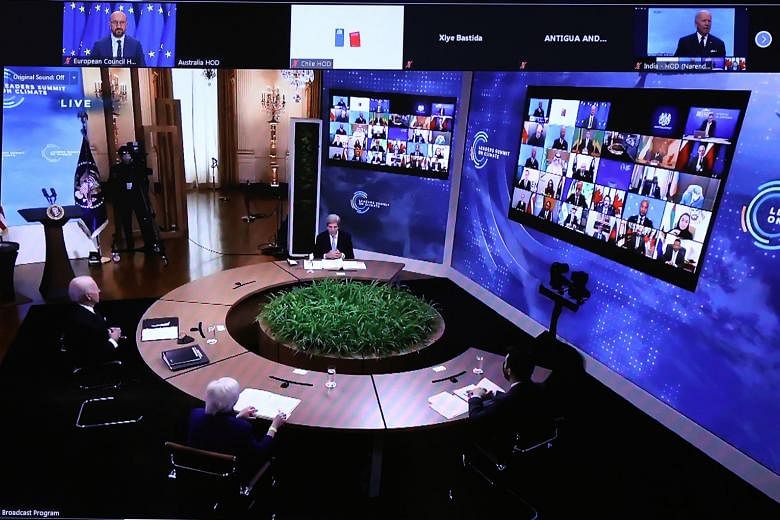WASHINGTON - Given how far behind efforts are to keep global warming to 1.5 deg C above pre-industrial levels, despite the pledges induced by US President Joe Biden's high-profile Climate Summit, adaptation to warming's worst effects must be a priority, the Summit heard on Thursday (April 22).
Water - and agriculture - are at the heart of the challenge to adapt. The United States itself is seeing billions of dollars' worth of damage from floods and wildfires, exacerbated by global warming and likely to only get worse if the current path of 3 deg C of warming continues.
Cora van Nieuwenhuizen, the Netherlands' Minister for Infrastructure and Water Management, in a breakout session on resilience and food security said, "Ninety per cent of all climate disasters involve water."
She urged a scale-up in investment in adaptation, saying she was ensuring that the Netherlands' foreign economic aid is equally focused "fifty-fifty on mitigation and adaptation".
Separately US Defence Secretary Lloyd J. Austin warned that the climate crisis is a "profoundly destabilising force for our world."
"Today, no nation can find lasting security without addressing the climate crisis," he told the Summit, which continues on Friday morning.
"We face all kinds of threats in our line of work, but few of them truly deserve to be called existential. The climate crisis does," he said.
"Climate change is making the world more unsafe and we need to act," he emphasised.
Speaking to reporters later at the White House, John Kerry, President Biden's Special Envoy for Climate Change, who alongside the President and Secretary of State Antony Blinken chaired some of the discussions at the Summit, said there had been progress "but we still have a heavy lift."
"Today, we've built a huge foundational building block... the world came together," he said.
"I'm not sanguine. The next six months of diplomacy will be absolutely critical.
"It's progress, but we still have a heavy lift and no one should doubt the challenges of the road ahead."
The "six months of diplomacy" was a reference to the six months left for the 26th Conference of the Parties in November in Glasgow, commonly called the UN Climate Conference, where commitments made will be legally binding.
"We have to strengthen trust between developing and developed countries," Morocco's Minister of Energy, Mines and Environment, Mr Aziz Rabbah, urged, at the discussion on resilience.
Mr Kerry acknowledged scepticism of the United States especially after the previous administration pulled the US out of the Paris Agreement on curbing global warming.
"We had to restore America's credibility. We had to prove that we were serious. And I think today does that in many ways," he told reporters.
US Secretary of Agriculture Tom Vilsack, chairing the discussion on resilience, said the Biden Administration's budget supports global climate action by investing US$1.2 billion (S$1.6 billion) to contribute to the Green Climate Fund to help developing countries reduce emissions and adapt to climate change.
"The budget also proposes US$480 million to support other multilateral climate initiatives, including US$100 million international climate adaptation programmes," he said.


